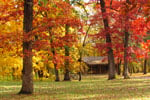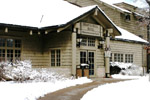MORAINE HILLS STATE PARK
From angling to hiking, from viewing rare plants to observing migratory waterfowl, Moraine Hills State Park offers you a recreational bounty. Located in the northeast corner of Illinois, the park is 3 miles south of McHenry. McHenry Dam, on the Fox River, is on the park's western border. Roughly half of the park's 2,200 acres is composed of wetlands and lakes.
Geology:
Moraine Hills derives its name from a geologic formation known as a moraine, which is an accumulation of boulders, stones and other debris deposited by a glacier. As glacial ice melted here following the Wisconsin glaciation period, it left gravel-rich deposits called kames that make up the park's wooded hills and ridges.
Natural Features:
A 48-acre lake near the center of the park was formed when a large portion of ice broke away from the main glacier and melted. Lake Defiance is gradually filling in with peat from its unstable shoreline. The lake is one of the few glacial lakes in Illinois that has remained largely undeveloped, maintaining a near-natural condition.
Pike Marsh, a 115-acre area in the southeast corner of the park, is home to many rare plants. Its outer fen area (a very rare marsh wetland) includes Ohio goldenrod, Kalm's lobelia, dwarf birch, and hoary willow, while cattails and bulrushes grow in its interior. Pike Marsh also supports one of the state's largest known colonies of pitcher plants, which attract, trap, and digest insects.
The 120-acre region known as Leatherleaf Bog is an excellent example of kettle-moraine topography. In geological terms, a kettle is a depression formed when an isolated block of glacial ice melts. The bog consists of a floating mat of sphagnum moss and leatherleaf surrounded by a moat of water. Marsh fern, marsh mari-gold, St. John's wort, and several species of willow put down roots here. Because both Pike Marsh and Leatherleaf Bog are dedicated nature preserves, they are protected by law.
Moraine Hills offers three examples of wetland enhancements. Yellow-head, Black Tern, and Opossum Run marshes are samples of what can be accomplished with a little help from man.
Wildlife:
For a wide spectrum of wildlife, Moraine Hills is home sweet home. Red fox, coyote, white-tailed deer, eastern cottontail, mink, opossum, and racoon inhabit the park, while more than 100 species of birds have been identified here. Great blue herons and green herons feed in the marsh areas in the summer, and the park is heavily used by migratory waterfowl, such as mallards, teal, wood ducks and Canada geese.
Artifacts found on the park property indicate man's presence in the area within 1,000 years of the Wisconsin glacier's retreat. Seasonal habitation of the park area extends back to approximately 4,000 B.C. Native American tribes that occupied or passed through the area include the Potawatomi, Sauk, Fox and possibly the Miami and Winnebago. The Sauk and Fox tribes, originally from what is now Canada, claimed ownership of the land at the time of white settlement.
Horace Long was the first known settler in the park area and occupied a portion on what is now the southeast corner of the park. Part of the stone foundation from his cabin still stands along the main park road.
In 1907, the original McHenry dam was built and a hand operated lock was constructed. The facilities were donated to the people of Illinois in 1924 and construction of a new concrete block dam began in 1934. In the early 1960's, a portion of the park property on the west bank of the Fox River was provided for the locks and managed by the Division of Water Resources.
In 1939, the State of Illinois made the initial land acquisition of 15 acres for the McHenry Dam State Park, located on the east bank of the Fox River. Major acquisition of the Lake Defiance area began in 1971, and construction of park facilities took place in the spring of 1975. The present Moraine Hills opened in October 1976.
The park features two conveniently located concession stands, one at the McHenry Dam and another on the lower level of the park office, on Lake Defiance. Both provide not only refreshments, but also boat rentals, bait, and tackle. The McHenry Dam Concession is open 7 days a week from April until October. The Lake Defiance Concession is open on weekends and holidays, when weather permits. Information can be found on the web at www.mchenrydam.com or by calling 815-385-5921.





